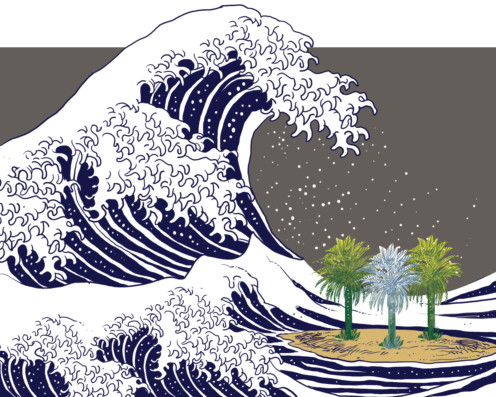
The UAE has emerged relatively calmly through a tumultuous year in the region dominated by threats from extremists and radicals. It has faced internal threats as a small group of nationals and expatriates inspired by Muslim Brotherhood ideology sought to destabilise the state. It has helped build a regional response to dangerous external threats as the fighting in Iraq and Syria allowed extremists to get a grip on regional politics.
The trials of a variety of Muslim Brotherhood supporters continued in the Security Court of the nation’s Supreme Court. Following the precedent set in earlier trials, reporting was allowed of both ongoing hearings of the trials and the final session when the verdicts were announced.
The UAE’s concerns over the activities of the Muslim Brotherhood were heightened earlier in the year when Qatar supported clerics speaking out in support of their points of view and backed similar activities in the Gulf and among Islamist parties in the region. This led to a dispute in which the UAE and Saudi Arabia led the way in articulating the mainstream Gulf Cooperation Council position and withdrawing their ambassadors from Qatar in an unprecedented display of anger.
The quarrel lasted for much of the year and was only resolved in November in the run-up to the Gulf Cooperation Council summit in Doha this month, when Qatar agreed to curtail its Islamist support and also backed President Abdul Fattah Al Sissi’s secular government in Egypt.
During 2014, the UAE took the lead in defining a positive Islamic alternative to the dire destructive message of the extremists of Daesh (Islamic State of Iraq and the Levant). As the terrorists fanned out across a large part of Iraq, murdering and torturing their opponents in their hundreds, the genuine Islamic agenda got lost in the flurry of horror and mayhem.
This is why the UAE spoke up for the tolerance that is key to knowing how genuine Islam operates. His Highness Shaikh Mohammad Bin Rashid Al Maktoum, Vice-President and Prime Minister of the UAE and Ruler of Dubai, took the lead in articulating a wider message that the UAE went on to argue and that should be an integral part of the coalition’s response to Daesh.
Shaikh Mohammad spoke of the need to take the lead in the intellectual and theological battle against Daesh, by supporting the importance of open thinking and tolerance, creating stable institutions that can engage people’s trust by running according to the rule of law and offering people economic opportunity so they can seek and achieve their ambitions.
And the UAE has a unique contribution to make to this debate as it is made up of seven previously separate emirates that each had their own sovereignty, governments and traditions. The leadership and the people of the different emirates within the UAE had to work hard to build the unified modern state that the UAE has now become and this successful experience of coming together is the basis of the UAE’s authority in speaking about tolerance and building institutions.
Necessary military task
Conservatives in the UAE were concerned that the country was getting too prominent in regional affairs and should continue to keep a low profile and concentrate on its economic projects and human development. But the urgency of the moment overwhelmed such thoughts as terrorists and extremists took advantage of the political vacuum and threatened to overwhelm the region.
But winning the theological and social argument against Daesh is only part of the battle. There is also a necessary military task and the UAE has been at the forefront, putting its armed forces into the 50-nation coalition that was formed this year to support the government of Iraq against extremists. With a nice symbolic touch, the first UAE warplane that attacked Daesh positions was piloted by Major Mariam Al Mansouri, an Emirati woman fighter pilot.
The coalition’s war in Iraq has spread into Syria where Daesh has had bases for some years. It will not be possible to defeat Daesh without intensifying the attacks on Daesh targets in Syria and American generals have been making their preparations, while US Secretary of State John Kerry has argued in Congress that such action may become essential.
Parallel to these purely military moves, the UAE made an important contribution to the debate on how to move ahead on Syria when Foreign Minister Shaikh Abdullah Bin Zayed Al Nahyan spoke repeatedly of the importance of finding a political solution to the Syrian civil war that has killed hundreds of thousands and sent millions into refugee camps, creating the world’s largest humanitarian crisis ever. The UAE’s point is that no military success will last unless accompanied by a return to inclusive political stability.
The UAE is also very concerned about Libya, a third Arab state that has collapsed. It is ready to back Egypt and is willing to find some way to promote stability in Libya, both for its own benefit and also to allay the threat that the civil war in Libya presents to Egypt, which the UAE sees as an essential bulwark against the on-going chaos in the region and a launch pad for any activity to restrain the extremists.








